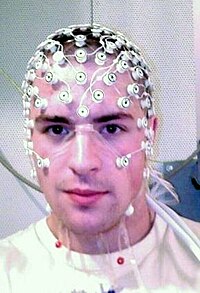
One turn at a time: Behavioral and ERP evidence for two types of rotations in the classical mental rotation task.
Sign Up to like & getrecommendations! Published in 2022 at "Psychophysiology"
DOI: 10.1111/psyp.14213
Abstract: We perform mental rotations in many everyday situations, such as reading a map or following furniture assembling instructions. In a classical mental rotation task, participants are asked to judge whether a rotated stimulus is presented… read more here.
Keywords: task; erp evidence; mental rotation; rotation ... See more keywords

Feedback Related Potentials for EEG-Based Typing Systems
Sign Up to like & getrecommendations! Published in 2022 at "Frontiers in Human Neuroscience"
DOI: 10.3389/fnhum.2021.788258
Abstract: Error related potentials (ErrP), which are elicited in the EEG in response to a perceived error, have been used for error correction and adaption in the event related potential (ERP)-based brain computer interfaces designed for… read more here.
Keywords: perceived error; related potentials; erp evidence; error ... See more keywords

Don’t Get Me Wrong: ERP Evidence from Cueing Communicative Intentions
Sign Up to like & getrecommendations! Published in 2017 at "Frontiers in Psychology"
DOI: 10.3389/fpsyg.2017.01465
Abstract: How to make sure that one’s utterances are understood as intended when not facing each other? In order to convey communicative intentions, in digital communication emoticons and pragmatic cues are frequently used. Such cueing becomes… read more here.
Keywords: erp evidence; cueing communicative; get wrong; wrong erp ... See more keywords

ERP evidence for emotion-specific congruency effects between sentences and new words with disgust and sadness connotations
Sign Up to like & getrecommendations! Published in 2023 at "Frontiers in Psychology"
DOI: 10.3389/fpsyg.2023.1154442
Abstract: Introduction: The present study investigated how new words with acquired connotations of disgust and sadness, both negatively valenced but distinctive emotions, modulate the brain dynamics in the context of emotional sentences. Methods: Participants completed a… read more here.
Keywords: new words; emotion; erp evidence; disgust sadness ... See more keywords